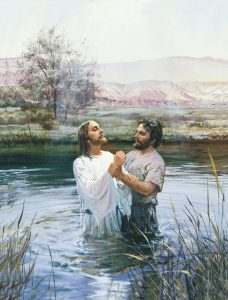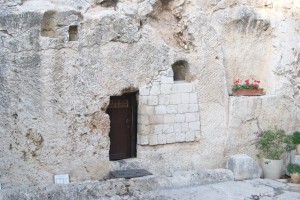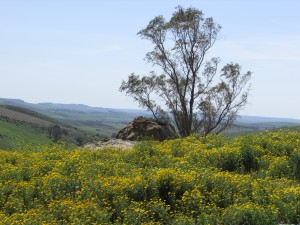Excerpted from The Testimony of Luke, by S. Kent Brown. This excerpt features the verse-by-verse commentary of Luke 3:16, 17. See the book for much additional analysis and the new rendition.
John answered, saying unto them all, I indeed baptize you with water; but one mightier than I cometh, the latchet of whose shoes I am not worthy to unloose: he shall baptize you with the Holy Ghost and with fire: Whose fan is in his hand, and he will throughly purge his floor, and will gather the wheat into his garner; but the chaff he will burn with fire unquenchable.
3:16 John answered: Here John’s response about himself points first to his ministering acts and then to the one who “cometh,” the same order as in John 1:26–27. According to John’s Gospel, the Baptist answers the queries of authorities by saying that he is not the Christ nor Elijah nor “that prophet” (John 1:20–21).
I indeed baptize you with water: Here Luke turns to words of John that he shares with Matthew and Mark, though Matthew adds “unto repentance,” a phrase missing in the records of Mark and Luke (see Matt. 3:11; Mark 1:8). Perhaps Luke means to place emphasis on the difference between the water baptism that the Baptist offers and the Messiah’s baptism “with the Holy Ghost and with fire” that not only comes to one who repents but also purges the person’s sins (see 2 Ne. 31:13–14; 3 Ne. 9:20; 12:2). The phrase “with water” or “in water” represents a dative of instrument.[1]
one mightier: As do Mark and Matthew, Luke acknowledges that John introduces Jesus to his hearers, though Jesus himself does not appear in the story until 3:21. The expression does not seem to preserve a Christian answer to persons who venerate the Baptist as the Messiah.[2]
cometh: The verb (Greek erchomai), though common, seems to allude to that of LXX Malachi 3:1 (“behold, he comes”), which points to the “coming one” who brings both judgment and purifying powers (see 13:35; Acts 13:25; Ps. 118:26; Zech. 9:9; Mal. 3:2–3; Mosiah 3:9; D&C 133:2, 10, 17, 19, 66; JST Matt. 3:38–40).[3] Because the verb appears strategically here, at the beginning of Luke’s narrative, and near its end (see 19:38; 20:16), it forms a possible inclusio that unifies the Gospel account.[4]
the latchet: The Greek word (himas) means “thong” or “strap.” The act of unbinding such a strap is left to slaves.[5] The word draws subtle attention to the connection of Jesus’ sandals and the highway to be built for the coming king.
baptize you with the Holy Ghost: In another allusion to the creation, that of the spirit of God moving “upon the face of the waters” (Gen. 1:2), John ties the actions of Jesus to those of Jehovah in the beginning. In his words to Nicodemus, Jesus speaks of being “born of . . . the Spirit,” an event equivalent to being baptized “with the Holy Ghost” (John 3:5).
with fire: The allusion is both to judgment or punishment and to purifying, aspects that stand together in Malachi’s prophecy about the one who comes “to his temple” (see Mal. 3:1–3). These two functions are also joined in modern scripture (see 1 Ne. 22:17; 2 Ne. 30:10). Moreover, fire is the agent that purges sins: “then cometh a remission of your sins by fire and by the Holy Ghost” (2 Ne. 31:17; see also 2 Ne. 31:13). Further, the clear tie between fire and offering sacrifices on a burning altar is not to be missed. Finally, the fire stands as an agent of testimony, along with the Holy Ghost. In this sense, the promise of fire is fulfilled in the burning hearts of the two disciples on the way to Emmaus, thus forming an inclusio that arcs across Luke’s narrative and brings a unity to all.[6]
3:17 he will throughly purge his floor: Threshing floors in ancient Israel consist of walled areas where the soil is cleared off to expose the smooth limestone crust of the earth. The expression means to “clean thoroughly” and carries the senses (1) that the Messiah will clean the soil from the floor where the grains of wheat will fall to the earth after being threshed and separated from the chaff, and (2) that, because the threshing floor is completely clean, he will be able to retrieve every grain.
the wheat . . . the chaff: A subtle affirmation stands within these terms that the good and the bad grow up together, often inseparable until the judgment (see Matt. 13:24–43).
the chaff he will burn with fire unquenchable: John returns to the image of fire as judgment.
[1] Blass and Debrunner, Greek Grammar, §195.
[2] Marshall, Luke, 145.
[3] BAGD, 310–11; TDNT, 2:666–69.
[4] Bauckham, Jesus and the Eyewitnesses, 124–47, 366–67, 388, 390–93.
[5] BAGD, 376; Marshall, Luke, 146; Fitzmyer, Luke, 1:473.
[6] Bauckham, Jesus and the Eyewitnesses, 124–47, 366–67, 388, 390–93.




